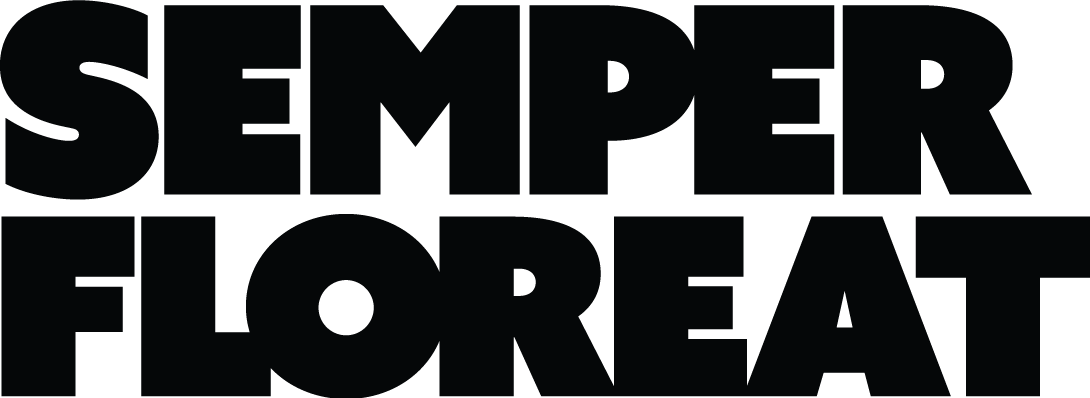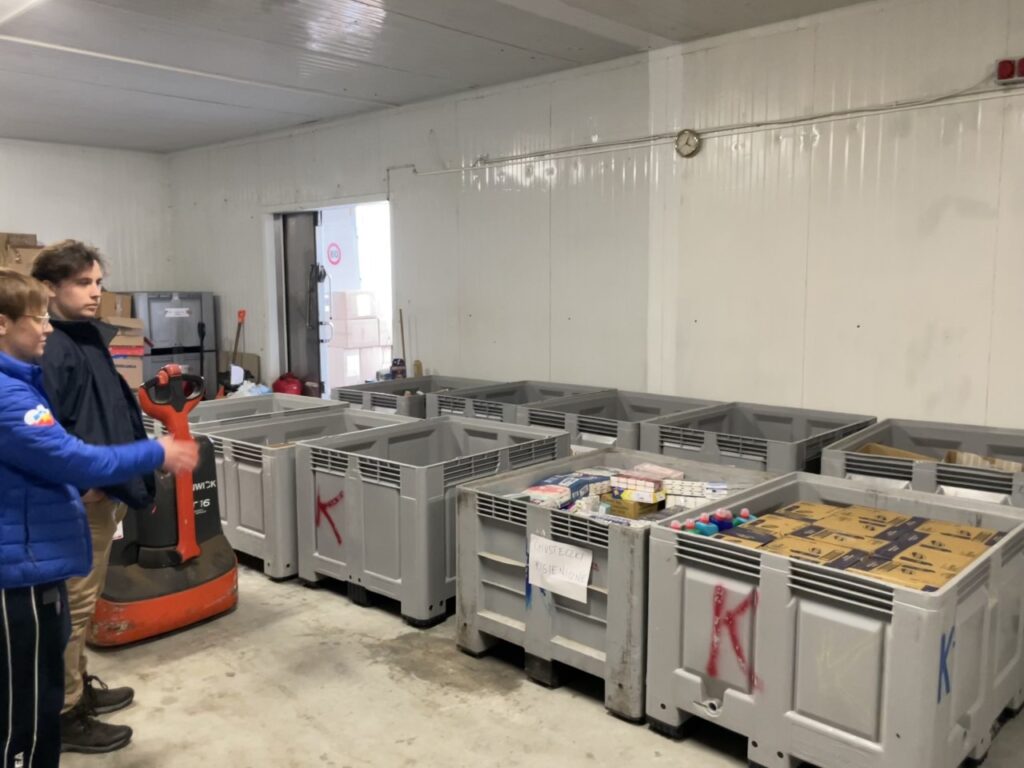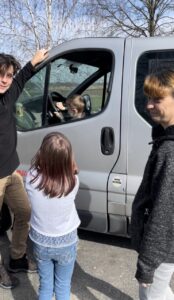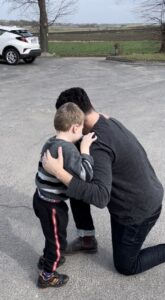
I’m writing now from our homebase in Austria, having spent the last week and a half sourcing and transporting supplies for Ukrainian refugees. We have covered almost six and half thousand kilometres in this period, and delivered supplies to: Uzhhorod, Ukraine; Tulcea, Romania; and Jaroslaw, Poland. Our focus has been logistical: establishing routes, vetting contacts, and connecting donors across Austria (a country mired by the influence of Russian state actors or, in other words, its oligarchy and mafia). What follows is a brief account of our work thus far, and information about what you can do to help the people affected by this war. Some things I cannot and will not write about, given their nature and to protect the identities of people involved.
Drew Pavlou fell ill shortly prior to our first mission (he caught the Norovirus, likely from Ukranians seeking refuge locally), so our party was comprised of: Democratic Alliance candidate for Chisholm and former freedom fighter in Hong Kong, Max Mok; our Slavic interpreter, Tomas Miljenović; and, as the only manual driver, your former, and hopefully future, long-suffering Chief Editor (myself [Billie Kugelman]).
We set off at midday in a van loaded with supplies (food, bandages, medicine, sanitary items, clothing, and blankets) donated by the local communities neighbouring our base, and travelled without incident through Slovenia.
Though Viktor Orbán condemned Russia’s invasion of Ukraine, he has not directly criticised Putin and maintains Hungary ought otherwise remain neutral. The Hungarian economy, and particularly its energy sector, has strong ties to Russia. We knew we were passing through hostile territory and the spectre of war was all around us. A day before we arrived in Uzhhorod, the Ukrainians detained more than twenty-five members of a Chechen death squad at the border after a lengthy fire-fight. We were a long way from home – memories of the UQ Union Complex with its Lolly Shop and beautiful vending machines seemed far away as we blazed *nonstop* through Hungary.
We did of course stop, to empty our tanks and refuel with jerry cans, but were disinclined to stay any longer than we had to in any one place. Our concerns were somewhat confirmed when, at a truckstop alongside the “HELL” energy drink factory, Tomas was outed by a well-educated skinhead as incapable of speaking German, having done so to ask for change for the 100 forint bathroom. Luckily the skinhead was midstream when Tomas made to escape.
Being stuck in Budapest’s city-centre peak hour traffic was not ideal, but some Eastern European DeepHouse on the radio lifted our spirits hugely; crossing the River Danube as the sun set was likewise surreal. Our spirits were dampened later on, in Northern Hungary, when Max started feeling the effects of Norovirus (yes, this became a bit of a theme for everyone but me), and Tomas’ GPS failed.
We arrived in Košice without further misadventure, stayed the night, and made for the Ukrainian border the following morning. The border crossing was as smooth as one could hope for, though the Ukrainians twice lost our documents, and otherwise asked for intra-border papers they had not yet issued. Max also noticed a warehouse emblazoned with Chinese characters which we later figured likely to be a surveillance and facial recognition facility. Zelinsky, if you’re reading this, Semper Floreat wants an interview, and questions about the Chinese state’s influence are on notice. Otherwise, we felt very safe amongst the AK-carrying soldiers, but, as we left and ventured further in, a sense of trepidation set in.
Passing abandoned cars on the road into Uzhhorod had me scanning for signs of bullet holes and scorch marks, thankfully to no avail. As we neared the city it became clear that, though the populace was vigilant, Uzhhorod is largely operational. Hearteningly, the beautiful green banks of the River Uzh were littered with people strolling up and down, and picnicking. This was a far cry from the war zones of Eastern Ukraine; Uzhhorod is one of the last Ukrainian cities yet to be besieged.
From Uzhhorod we drove to a Ukrainian village, Dovhe Pole, where we unloaded the truck at a warehouse. From there, we met one of Tomas’ contacts to discuss delivery of various other goods.
Leaving Ukraine took a lot longer than entering. Amongst the traffic were aid workers and refugees, some on foot and pushing childrens’ trams. I’m honestly not sure whether the latter is preferable to the scenario I encountered earlier in the week, where I was driving a Ukrainian mother and her three-month-old child – who she would not put in a car seat (I had to drive as though my soul depended on her survival, which it did).
Our second major supplies mission saw Drew and Max fly ahead to meet with Romanian parliamentarians. Driving through the Transylvanian Alps was invigorating – truly there is nothing I like better than being trapped on a serpentine road, amidst heavy rain, and between an impatient truck and slow SUV, with a steady stream of cars passing us in the opposite direction.
Bucharest’s traffic was somehow worse than Budapest’s. We stayed the night in a donated apartment with a view looking out towards the Casa Poporului, Romania’s “People’s House” – the heaviest and most expensive administrative building in the world, ordered into construction in 1984 by Nicolae Ceaușescu.
We enjoyed a Shisha that evening, and left the following morning for the Ukrainian Government’s warehouse on the border. Tulcea saw us closer to the conflict than we’d been in Uzhhorod – wayward missiles continue to pose a slight risk. A theme which pervaded every operation we made contact with was that they were all on the cusp of scaling up.
Poland Welcomes (PW), an organisation put together by a few mates in the space of a week (literally sleeping under their desks), was another instance of this theme, but with more complexity than anything else we’d encountered. From what we saw at the border crossing in Medyka, the key issue is not receiving refugees and providing them with sustenance, warmth, and medical assistance. Rather, it is housing them in Poland and elsewhere in Europe. This is where organisations like PW come in. PW provides beds, food, healthcare, and education, across five locations for roughly 500 refugees. They currently have 2000 beds, but need to scale-up their intake of supplies to be able to take on this number.
While we were there, we met refugees – all of which are women and children with equally harrowing tales of having escaped the brutality of the war, and leaving their husbands and brothers behind. The children are happy though, and we shared some hopeful moments; one cheeky lad – a regular road hog – snuck into the cab of our van and began honking the horn gleefully.
We also rubbed shoulders with paratroopers from the US Army’s Civil Affairs department, Canadian diplomats, and U.N. representatives. I mention this to lend further credibility to Poland Welcomes – it’s the real deal. If you have a spare $10AUD, you could buy a refugee a night of warmth and security. {polandwelcomes.org}
So ends my report. We have more trips planned, to Lviv and elsewhere, and are organising more drivers (et cetera), in an effort to turn the routes we’ve taken into a sustainable operation.
Amongst all of this we have had some fun too – smokes are cheap in Eastern Europe; also, sometimes you simply have to go dark, or even blind, and that is all I will say about that.
Slava Ukraini, Heroyam Slava

Views: 73





